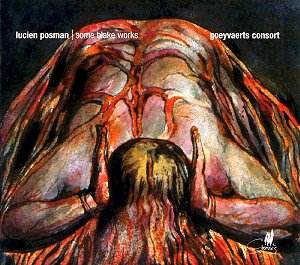Now in his early fifties, Lucien Posman, who studied
– among others – with Roland Coryn, has a considerable body of works
to his credit, mostly chamber, choral and vocal music as well as
a 3-act chamber opera and a symphony (for whistler and orchestra).
Many of his vocal and choral works set various poems by William
Blake whose poetical work obviously means much to him. So, besides
the choral works recorded here (all on texts by Blake), one may
also mention a Christmas cantata Welcome Stranger to this
Place (1999 - soloists, chorus, six winds and piano duet),
Wheel within Wheel (1987 – soprano, trombone and small
orchestra) and Hang your serious Song (2002 – baritone,
chorus, double bass and piano), as well as other works setting a
wide variety of texts.
Among Blake’s works, Songs of Experience
seems to have had a considerable impact on the composer since
he has composed 26 settings for various combinations (voice and
piano, chorus with or without instruments, and a recent setting
of The Tyger for two sopranos, chorus and harpsichord).
In Songs of Experience, Blake confronts the harsh social
situation of his time by parodying his own Songs of Innocence,
thus showing "the two contrasting states of the Soul".
Poems such as the ones set by Posman in his Ten Songs of
Experience completed in 1996 (a first set of Five
Songs of Experience also for mixed chorus was composed
in 1988) express the poet’s often pessimistic reflections on some
cruelly unjust social realities of his time, as in Holy Thursday
("Babes reduc’d to misery"), The Chimney Sweeper
(which also indirectly inspired Britten’s The Little Sweep),
The Little Vagabond, Infant Sorrow or The Schoolboy
("How can a child when fears annoy/But droop his tender wing/And
forget his youthful spring?").
The Book of Los, completed in
2000, is an ambitious large-scale work for soprano, chorus, flute/piccolo/alto
flute and piano in four movements. Blake’s long symbolic poem
is in four chapters. It might be considered a choral symphony
in all but the name. In the first chapter, Eno "the aged
mother" ponders on times past, the oncoming of decay ("But
Covet poured full/Envy fed with fat of lambs") and the advent
of evil forces. Los ("the Eternal Prophet") bound in
chains is "compell’d to watch Urizen’s shadow" surrounded
by fires that "froze in a vast solid without fluctuation".
The second and third chapters tell the story of the fall of Los
and the creation of the elements. Los pulverises the substance
in which he is caught and falls down thus liberating the four
competing elemental forces: Blake’s version of the Big Bang theory.
The fourth chapter deals with man’s creation, "a human illusion".
Two shorter works: To the Evening Star
for mixed chorus and To Morning for female voices,
both settings of early Blake poems composed in 2000, complete
this fairly comprehensive survey of Posman’s recent choral output.
The common denominator of Posman’s Blake settings
(at least, the ones recorded here) is their utter simplicity and
straightforwardness. These generally syllabic settings avoid any
complex polyphony instead moving on in wide-spread chords encompassing
extreme registers. They are by no means easy to sing, though they
conspicuously avoid any attempt at "modern" vocal writing.
They put severe demands on singers, as far as attack and intonation
are concerned, and the many challenges set by these scores are
met with unfailing musicality and assurance in the Goeyvaerts
Consort’s immaculate singing. There are, however, some subtle
differences between The Book of Los which may be
best experienced as a slow moving ritual and Ten Songs of
Experience which call for and get a more varied approach.
This is music of great beauty and lyrical appeal,
and there is much to relish in this beautifully simple but superbly
crafted music that should appeal to choirs willing to explore
some unfamiliar, challenging but ultimately rewarding repertoire.
Warmly recommended.
Hubert Culot
